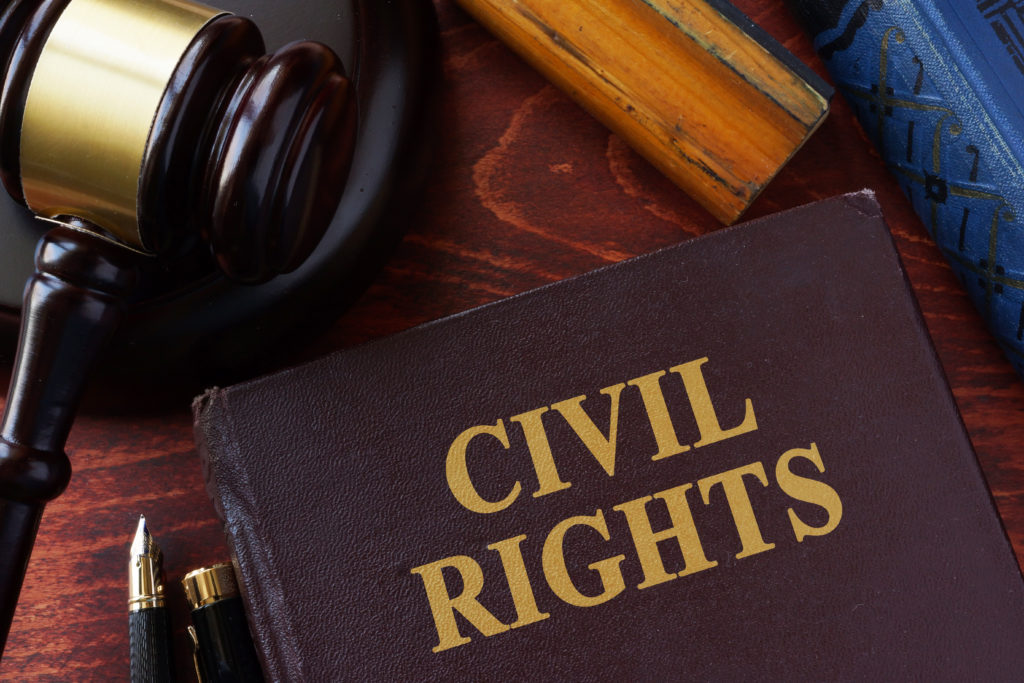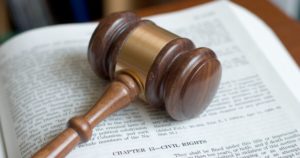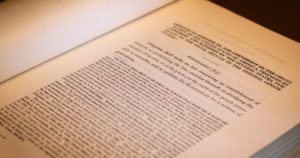Virginia Beach Civil Rights Lawyers
The Declaration of Independence declares everyone is created equal and that we are endowed by our Creator with certain unalienable rights, including life, liberty, and the pursuit of happiness. The Bill of Rights guarantees all United States citizens individual rights and freedoms, which are considered sacred in this country. The country was founded on these principles; however, that does not mean that everyone respects the rights of everyone else.
There have been multiple instances in which people’s civil rights have been violated, whether that be by another individual, an institution, or the government itself. Despite those rare exceptions, the law is geared to protect its citizens from these violations.
Although the law does protect a person’s civil rights, it is by no means an easy task. There are complications with civil rights laws that put a person’s civil rights at odds against the rights of the rest of society. When a person believes that their civil rights have been violated, they should reach out to a civil rights lawyer such as the ones at Anchor Legal Group, PLLC who can help resolve the situation.
What are Civil Rights?
All citizens of the United States and Virginia have certain civil rights guaranteed to them by the U.S. Constitution and multiple laws and amendments adopted over the years. In most instances, a person’s civil rights can come under attack from those who hold authority over them. Those areas include the following:
- Police misconduct
- First Amendment violations
- Malicious prosecution
- Racial profiling
- Unwarranted search
- Wrongful conviction

What Laws Guarantee a Person’s Civil Rights?
Although the Constitution establishes the structure and function of the U.S. government, it is the Bill of Rights, or the first 10 Amendments to the Constitution, that establish a citizen’s civil rights. They represent the cornerstone of the nation’s civil rights, although there are those that feature more prominently than others. They include these Amendments:
- First Amendment: This guarantees every citizen the right to free speech, to practice their own religion, and the right to peacefully assemble.
- Fourth Amendment: This protects citizens from an unreasonable search and seizure.
- Fifth Amendment: This protects a person who is tried for a crime and acquitted the right not to be prosecuted again for the same crime. It also protects someone from incriminating themselves in a criminal case.
- Sixth Amendment: Guarantees that the defendant in a criminal trial has a right to be represented by counsel and a right to a speedy and fair trial.
- Eighth Amendment: Protects against cruel and unusual punishment.
Although the Bill of Rights provided the initial civil rights for citizens, over the years it became necessary for Congress to pass additional laws guaranteeing that everyone was guaranteed the same civil rights as outlined by the framers of the Constitution. Those laws included the following:
- Section 1983 Litigation: This refers to lawsuits brought under Section 1983 (Civil action for deprivation of rights) of Title 42 of the United States Code (42 U.S.C. § 1983). Section 1983 provides an individual the right to sue state government employees and others acting “under color of state law” for civil rights violations. Section 1983 does not provide civil rights; it is a means to enforce civil rights that already exist.
- Age Discrimination Act of 1975: This law prohibits an institution that receives federal money from discriminating against someone because of their age. Such services include educational programs, health care services, housing, welfare, food stamps, and rehabilitation programs.
- Age Discrimination in Employment Act (ADEA): This law prevents the discrimination of job applicants and employees who are over the age of 40. The law addresses compensation, advancement opportunities, and other employment conditions.
- Americans with Disabilities Act (ADA): This law protects those who have a disability or are perceived to have a disability in employment, state and local government, public accommodations, commercial facilities, transportation, and telecommunications. This law guarantees that everyone has equal access to buildings and other facilities as well.
- Civil Rights Act of 1964: This major piece of legislation was the culmination of the civil rights movement and made it illegal to discriminate against someone based on their race, color, religion, sex, or national origin. This all-encompassing bill addressed employment, education, voting, and public accommodations.
- Fair Housing Act (FHA): Law states that no one can be denied access to housing based on their race, religion, sex, familial status, and disability.
- Section 504 of the Rehabilitation Act of 1973: This was the first disability civil rights legislation passed in the United States. The law prohibits the discrimination of those with disabilities from programs receiving federal financial assistance.
- Voting Rights Act of 1965: Another accomplishment of the civil rights movement, this law targeted those states that were making it difficult for certain citizens to vote. The law made it illegal for certain barriers to be placed on a person’s right to vote.
These and other laws have established and enforced civil rights for millions of citizens who believed that they did not have the same rights as others. Despite these laws, there continues to be challenges that some individuals must endure.
How can a Lawyer Help My Civil Rights Case?

The civil rights lawyers at Anchor Legal Group, PLLC can help those clients who believe that their civil rights have been violated. They will assess a case and determine the correct course of action. Anchor handles civil law cases in numerous practice areas.
Police Misconduct
One of the most difficult jobs in the United States is that of a police officer. They put their lives on the line every day to protect the citizens of their community. Unfortunately, not all police officers recognize the limits of their authority.
Those who choose to misuse their authority should be brought to justice, and those they hurt have a right to seek compensation for the loss of their civil rights and other harm (including serious injury or wrongful death) from the municipality that employs the officer. Some examples of common types of police misconduct include the following:
- False arrest: This is when a person believes that they have been arrested under false pretenses or that their Fourth Amendment rights have been violated.
- Excessive use of force: This refers to force in excess of what a police officer reasonably believes is necessary. A police officer may be held liable for using excessive force in an arrest, an investigatory stop, or other seizures. A police officer may also be liable for not preventing another police officer from using excessive force. Whether the police officer has used force in excess of what he reasonably believed necessary at the time of action is a factual issue to be determined by the jury.
- Failure to intervene: If an officer is engaging in force beyond what is necessary and their fellow officers do not intervene on the victim’s behalf.
First Amendment Violations

The First Amendment provides the most basic rights on which the United States was founded, including the right to free speech, the right to practice religion, and the right to peacefully assemble. Over the years, these rights have been challenged by the government and individuals. In certain instances, the argument has been made that certain free speech rights must be squashed for the good of the people. In most cases, a person’s right to free speech is absolute as far as the government is concerned.
It should be noted, however, that the First Amendment protects an individual’s free speech from a response from the government. It holds no such guarantee for a person from a private company. For instance, if an employee of a certain company posts negative comments on their social media page about their employer and the company finds out about it and terminates the person’s employment, the person cannot file suit on first amendment grounds.
Other areas of First Amendment rights include:
- Freedom of information and open meeting laws: This pertains to the preparation of information requests, subpoenas, and advice on the statutory obligations of organizations subject to these laws.
- Rights of association: The rights for non-profit organizations and political parties to meet without unlawful interference.
- Religious liberties: Protecting those religious institutions that face unlawful discrimination or efforts by the government to impose impermissible limits in religious or anti-religious communications.
- Prior restraint: Defending those whose freedom of speech has been either suppressed or denied.
- Free speech in the marketplace: This is a fine line between protecting free speech and those laws that pertain to unfair competition, trademark, trade dress, deceptive advertising, cyberpiracy, and dilution of intangible property rights.
Malicious Prosecution
This will take place when a member of the legal system or the system itself files a criminal court case against an individual even if they know that the charges against that individual are false. They might not have sufficient evidence to convict the person, but they move forward on filing charges anyway.
To constitute a malicious prosecution charge, the plaintiff, or the person who has the charges filed against them, must have already obtained a positive result in an earlier charge. It could be a person who was acquitted, but the prosecutor, believing the person to be guilty, filed numerous other charges to get the person behind bars.
The opportunity for malicious prosecution is great in Virginia because of the relative ease in which a person can file criminal charges against an individual. Anyone can file charges by swearing out a warrant in front of a judge. Police officers can also bring charges, but more often it is individuals outside of the criminal justice system.
When a victim of malicious prosecution is seeking to file a suit in response, there are several factors that they need to consider. First, the result of the prosecution must be unfavorable to them. For instance, if they take a plea bargain for a lesser charge, they then cannot turn around and sue claiming malicious prosecution. When filing a lawsuit for malicious prosecution, the plaintiff must prove four things in the subsequent lawsuit. They are as follows:
- The defendant’s conduct was malicious and not a mistake.
- The defendant initiated or assisted in the filing of the charges.
- Despite not having probable cause, the defendant pursued the case anyway.
- The case concluded with an unfavorable result for the plaintiff.
When looking at who might be liable for a civil action in response to a malicious prosecution charge, the person would be the prosecutor who pursued the charges even though they knew they were false. If a prosecutor believes the charges they are pursuing to be true, they are not liable. However, if on learning that the charges are not true, they are obligated to drop the relevant charges or else risk facing a malicious prosecution lawsuit.
Racial Profiling
Racial profiling is the practice that certain law enforcement officials will use as probable cause to pull an individual over. In many cases, the practice is an innocent circumstance, given the officer is seeking a certain person who matches a particular description. Unfortunately, there are those officers who will target a person of a particular race and only that race and pull them over for that reason.
Profiling occurs all the time, with officers also profiling individuals based on their age or their gender. However, racial profiling has garnered significant media attention. Police officers are prohibited from pulling someone over based purely on their race. To prove a case of racial profiling, a plaintiff must demonstrate that an officer was targeting only a particular race in routine stops.
Unwarranted Search
Under a legal search, a police officer or other government official has the authority to search a person’s personal property looking for specific evidence. The Fourth Amendment grants every citizen protection from an unlawful search. Everyone has a right to privacy and that their possessions remain private. Private possessions are those that are not in plain sight and carry with it a reasonable expectation of privacy. In other words, if the property is in the front yard without a fence, there is not a high expectation of privacy.
There are four instances when a search will be considered lawful. Those instances are as follows:
- Consent given: When a person gives the authorities permission to search their property or belongings.
- Reasonable suspicion: An officer must have reasonable suspicion that a person is breaking the law or in the act of breaking the law that would warrant an immediate search.
- Warrant issued: If an officer suspects a person of a crime and wants to search their private property, they must obtain a warrant. They must present the evidence they have obtained to a judge. Once the judge approves the warrant, the police can execute the search for only the areas listed in the warrant.
- Exigent circumstances: An officer can perform a search if they believe if they do not act immediately, evidence will be destroyed or removed from the scene.
When evidence is obtained against a suspect falsely, a civil rights lawyer will be able to argue the merits of the case in court. There are times when a police officer will make an honest mistake. Unfortunately, there are also rare instances when they will lie to obtain a search warrant or just neglect obtaining a warrant in the first place. When these situations occur, a lawyer will argue against the use of the evidence obtained from these unlawful searches and a judge can then throw out any evidence obtained as a result.
Wrongful Conviction
The criminal justice system is not perfect. There are unfortunately instances in which the person is convicted for a crime that they did not commit. The Commonwealth of Virginia takes wrongful convictions very seriously, which is why its Attorney General launched a Conviction Integrity Unit, made up of three lawyers and an investigator. The group reviews petitions from those who claim to have been wrongfully convicted.
There are a variety of reasons why a person could be wrongfully convicted for a crime. Not all of them represent malicious intent by a prosecutor or someone else. There are certain times when an honest mistake could cause a conviction. The most common reasons for an inaccurate conviction are the following:
- Witness error: A significant number of cases depend on eyewitness testimony about a crime. Unfortunately, a witness’ memory can be unreliable or prone to suggestion. Witness error has led to the overturning of several convictions in Virginia, according to the National Registry of Exonerations (NRE), which found that 23 of the state’s 45 wrongful convictions involved erroneous testimony from eyewitnesses.
- Deliberate misconduct: There are instances in which a witness or a prosecutor will deliberately lie to manipulate the system to obtain the result they desire. It is estimated that about 23 of the state’s 45 wrongful convictions involved official misconduct, while 20 involved perjury or false accusations, according to the NRE.
- Forensic mistakes: With advances in science and forensics, this area has become a cornerstone of building a case for prosecutors. Using forensics, authorities can often place a suspect at a scene of a crime. However, the science is not absolute, and in certain instances there can be flaws in the system that are minimized or underestimated. In rare instances, forensic records can be tampered with.
- Self-incrimination: There are times when a confession is obtained from a suspect, and in certain instances that confession is coerced from a suspect illegally. The suspect may confess to end an interrogation or get out of custody. Unfortunately, once a person confesses, it becomes difficult to retract it.
Those who believe that they have been wrongfully convicted of a crime should hire a civil rights lawyer who can help them petition the Conviction Integrity Unit to have their case reviewed.



